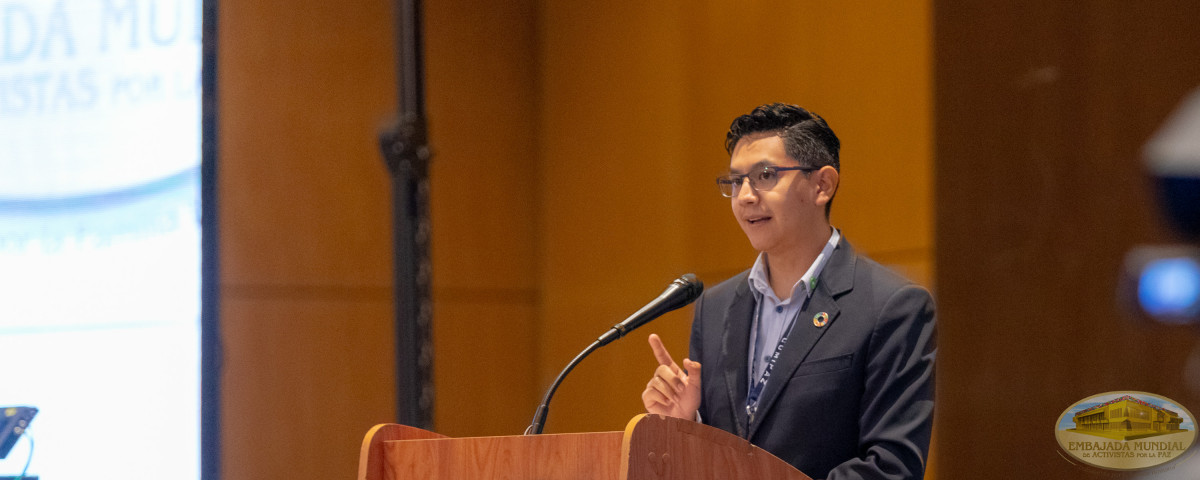
Alejandro Ruíz | CSR and Sustainable Business Models: A step towards the Constitution of the Rights of Mother
Well, good afternoon, thank you for the opportunity.
I would like nothing more to quote a little of where I come from. I am Director of Corporate Social Responsibility of the Yucatecan Business Foundation, a regional ally of the Mexican Center for Philanthropy, with whom we have promoted a social responsibility distinction for more than 19 years.
And well, it is an honor to be here today sharing this type of experience in order to limit and share what we are doing and what we can take, so with alliances, with this networking, with this commitment we are making.
I allowed myself to make some annotations since time is short, and is the only resource that is not renewable.
So, I would like to start by identifying what companies are created for. Companies, their purpose is to satisfy a need by means of granting goods and services. Therefore, the responsibility brings that philanthropic sense within its concept. As such, Social Responsibility encompasses a concept of being congruent with the way in which I am generating those resources in a sustainable manner.
And understanding the concept "in a sustainable way," I wish you could raise your hands... I'm going to say three types of ice cream and you have to choose one, which one you like best: Vanilla, strawberry and chocolate. I want you to raise your hand, those of you who like strawberry ice cream more… vanilla ice cream… chocolate ice cream.
A study states that those people who raised their hands for strawberries are the ones who like the environmental issue the most; those who raised their hands for chocolate are more interested in the social issue; and those who raised their hands for vanilla ice cream, are more interested in the economic issue, they are interested [only in money].
The factor of sustainability, what it tells us is that we have to think of a Neapolitan ice cream; in a Neapolitan ice cream, because the resources, the economic factor (our vanilla ice cream) helps us to think about a sustainability issue: We need resources to pay good salaries, to bring more services and products to more communities. It helps us to be able to attend environmental needs and mitigate those environmental impacts. However, in the equation, we cannot leave out the social issue and the environmental issue. From now on, I hope we can think and make all our decisions thinking of a Neapolitan ice cream.
And it is there, where on the subject of circular economy… Which has been one of the greatest challenges we have had, because in this linear economy (which we call capitalism), those of us who are lovers of the environment they have called us crazy, tree huggers, etc., and for that reason we have had to start speaking the same language that the entrepreneur speaks; to be talking about an environmental economy, to be talking about a Degree in Environmental Resources Management, environmental laws; and we have had to start adapting to this same ecosystem.
That is why, within this equation, we are trying to involve environmental services by assigning a value to them; what is the real value that these environmental resources have in order to be able to protect them and start being competitive from an economic perspective that the world is marking for us today.
However, for this we must work on being aware of the way in which we are applying those actions. We call it “awakening the dreamer,” where, with the example they mentioned this morning with coffee, I ask myself: When we take our cup of coffee do we consciously so that it is organic coffee, that is a coffee free of child labor, where deforestation was not generated, where a fair price was paid for the coffee I am consuming?
And that implies changing a vision of awareness and being more congruent with the way in which we take these actions.
From the part that rests on us for this promotion, the first thing we do is to standardize these concepts. If today we talk about the tools that exist, we have heard an ISO 26000, we have heard the principles of the Global Compact, we have spoken about the lines of action that promote sustainability, the axes, the CSR areas from the socially responsible company standpoint; but they all work under one vision, the vision of the development of the common good.
And it is there, where we have found, in the Sustainable Development Goals, in Objective 17, it has a peculiarity of being at the end; and it is not that it is the least responsible, rather, it is the one that intervenes in all the other 16.
And for we have started to promote initiatives, strategies with a vision of alliance, that in the end I would like to present what we have been able to do, to contribute, thanks to this invitation and where we are going to truly formalize the alliance with the Global Embassy of Activists for Peace, to involve the Inter-American Environmental Charter in the Proclamation of the Constitution of the Rights of Mother Earth, adding it to our alliance for the sustainability of the Yucatan Peninsula.
We talk about criticism; we say many things "are wrong.” Well, I will say to you, what are we proposing to make things positive? But finally, what do we commit ourselves to do so that these things work in the long term?
Thank you very much for your attention.